[HOME PAGE] [STORES] [CLASSICISTRANIERI.COM] [FOTO] [YOUTUBE CHANNEL]
The Project Gutenberg EBook of Ratón Pérez, by Luis Coloma This eBook is for the use of anyone anywhere at no cost and with almost no restrictions whatsoever. You may copy it, give it away or re-use it under the terms of the Project Gutenberg License included with this eBook or online at www.gutenberg.org Title: Ratón Pérez Author: Luis Coloma Illustrator: Mariano Pedrero Release Date: June 29, 2011 [EBook #36558] Language: Spanish Character set encoding: ISO-8859-1 *** START OF THIS PROJECT GUTENBERG EBOOK RATÓN PÉREZ *** Produced by Chuck Greif and the Online Distributed Proofreading Team at http://www.pgdp.net (para Lucia)
Ratón Pérez


CUENTO INFANTIL
Por el P. LUIS COLOMA. S. J..
de la Real Academia Española.
Dibujos de M. Pedrero.

MADRID
Administración de RAZÓN Y FE
Plaza de Santo Domingo, 14, bajo.
—
1911

MADRID.—Est. Tip. «Sucesores de Rivadeneyra».

Á SU ALTEZA REAL EL SERENISIMO
SEÑOR PRÍNCIPE DE ASTURIAS,
DON ALFONSO DE BORBÓN Y BATTENBERG.
Señor:
Hace cerca de veinte años que escribí estas páginas para S. M. el Rey D. Alfonso XIII, vuestro augusto padre. Permitidme, Señor, que, al reimprimirlas hoy, las dedique á V. A., deseoso de que arraigue en vuestra alma, tan honda y fructuosamente como arraigó en vuestro padre, la sencilla y sublime idea de la verdadera fraternidad humana.
Que Dios bendiga á V. A. como de todo corazón lo pide diariamente, su affmo. en Cristo,
Luis Coloma, S. J.


Sembrad en los niños la idea, aunque no la entiendan: los años se encargarán de descifrarla en su entendimiento y hacerla florecer en su corazón.
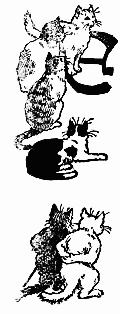 ntre la muerte
del rey que rabió
y el advenimiento
al trono
de la reina Mari-Castaña
existe un largo y obscuro
período en las crónicas,
de que quedan pocas memorias.
Consta, sin embargo,
que floreció en aquella época
un rey Buby I, grande amigo
de los niños pobres y protector
decidido de los ratones.
ntre la muerte
del rey que rabió
y el advenimiento
al trono
de la reina Mari-Castaña
existe un largo y obscuro
período en las crónicas,
de que quedan pocas memorias.
Consta, sin embargo,
que floreció en aquella época
un rey Buby I, grande amigo
de los niños pobres y protector
decidido de los ratones.
Fundó una fábrica de muñecos y caballos de cartón para los primeros, y sábese de cierto, que de esta fábrica procedían los tres caballitos cuatralbos, que regaló el rey D. Bermudo el Diácono á los niños de Hissén I, después de la batalla de Bureva.

Consta también que el rey Buby prohibió severamente el uso de ratoneras y dictó muy discretas leyes para encerrar en los límites de la defensa propia los instintos cazadores de los gatos: lo cual resulta probado, por los graves disturbios que hubo entre la reina doña Goto ó Gotona, viuda de D. Sancho Ordóñez, rey de Galicia, y la Merindad de Ribas de Sil, á causa de haberse querido aplicar en ésta las leyes del rey Buby al gato del Monasterio de Pombeyro, donde aquella Reina vivía retirada.
El caso fué grave y sus memorias muy duraderas, por más que unos autores digan que el gato en cuestión se llamaba Russaf Mateo, y otros le llamen simplemente Minini. De todos modos el hecho resulta probado, aunque nada diga sobre ello Vaseo, ni tampoco lo mencione el Cronicón Iriense, y el bueno de D. Lucas de Tuy haga como que se olvida del caso, quizá, quizá, por razones de conveniencia.
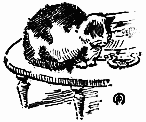
Consta también que el rey Buby comenzó á reinar á los seis años bajo la tutela de su madre, señora muy prudente y cristiana, que guiaba sus pasos y velaba á su lado, como hace con todos los niños buenos el ángel de su guarda.
Era entonces el rey Buby un verdadero encanto, y cuando en los días de gala le ponían su corona de oro y su real manto bordado, no era el oro de su corona más brillante que el de sus cabellos, ni más suaves los armiños de su manto que la piel de sus mejillas y sus manos. Parecía un muñequito de Sévres, que en vez de colocarlo sobre la chimenea, lo hubieran puesto sentadito en el trono.

Pues sucedió, que comiendo un día el Rey unas sopitas, se le comenzó á menear un diente. Alarmóse la corte entera, y llegaron, uno en pos de otro, los médicos de Cámara. El caso era grave, pues todo indicaba que había llegado para S. M. la hora de mudar los dientes.
Reunióse en consulta toda la Facultad; telegrafióse á Charcot, por si venía complicación nerviosa, y decretóse al cabo sacar á S. M. el diente. Los médicos quisieron cloroformizarle, y el Presidente del Consejo sostuvo porfiadamente esta opinión, por ser él tan impresionable, que nunca dejaba de hacerlo cada vez que se cortaba el pelo.
Pero el rey Buby era animoso y valiente, y empeñóse en arrostrar el peligro cara á cara. Quiso, sin embargo, confesarse antes, porque faena hecha no ocupa lugar, y después de todo, lo mismo puede escaparse el alma por la herida de una lanza, que por la mella de un diente.

Atáronle, pues, al suyo una hebra de seda encarnada, y el médico más anciano comenzó á tirar con tanto pulso y acierto, que á la mitad del empuje hizo el Rey un pucherito, y saltó el diente tan blanco, tan limpio y tan precioso como una perlita sin engaste.
Recogiólo en un azafate de oro el gentilhombre Grande de guardia, y fué á presentarlo á S. M. la Reina. Convocó ésta al punto el Consejo de Ministros, y dividiéronse las opiniones.

Querían unos engarzar en oro el dientecito y guardarlo en el tesoro de la Corona; y proponían otros colocarlo en el centro de una rica joya, y regalarlo á la imagen de la Virgen, patrona del Reino. Pareceres ambos en que descubrían aquellos ministros cortesanos, más bien el deseo de halagar á la madre, que el de servir á la Reina.
Mas esta Señora, que como mujer lista no fiaba de aduladores y era muy prudente y amiga de la tradición, resolvió que el rey Buby escribiese á Ratón Pérez una atenta carta, y pusiese aquella misma noche el diente debajo de su almohada, como ha sido y es uso común y constante de todos los niños, desde que el mundo es mundo, sin que haya memoria de que nunca dejase Ratón Pérez de venir á recoger el diente y á dejar en cambio un espléndido regalo.
Así lo hizo ya el justo Abel en su tiempo, y hasta el grandísimo pícaro de Caín puso su primer diente, amarillo y apestoso como uno de ajo, escondido entre la piel de perro negro que le servía de cabecera. De Adán y Eva no se sabe nada: lo cual á nadie extraña, porque como nacieron grandecitos, claro está que no mudaron los dientes.
Apuradillo se vió el rey Buby para escribir la carta; pero consiguiólo al cabo, y no sin grande suerte, pues tan sólo llegó á mancharse de tinta los cinco dedos de cada mano, la punta de la nariz, la oreja izquierda, un poco del borceguí derecho y todo el babero de encajes desde arriba hasta abajo.
*
* *

Acostóse aquella noche más temprano que de costumbre, y mandó que dejasen encendidos en la alcoba todos los candelabros y arañas. Puso con mucho primor debajo de la almohada la carta con el diente dentro, y sentóse encima dispuesto á esperar á Ratón Pérez, aunque fuese necesario velar hasta el alba.


Ratón Pérez tardaba, y el Reyecito se entretuvo en pensar el discurso que había de pronunciarle. Á poco abría Buby mucho los ojitos, luchando contra el sueño que se los cerraba: cerróselos al fin del todo, y el cuerpecillo resbaló buscando el calor de las mantas, y la cabecita quedó sobre la almohada, escondida tras un brazo, como esconden los pajaritos la suya debajo del ala.
De pronto, sintió una cosa suave que le rozaba la frente. Incorporóse de un brinco, sobresaltado, y vió delante de sí, de pie sobre la almohada, un ratón muy pequeño, con sombrero de paja, lentes de oro, zapatos de lienzo crudo y una cartera roja, terciada á la espalda.
Miróle el rey Buby muy espantado, y Ratón Pérez, al verle despierto, quitóse el sombrero hasta los pies, inclinó la cabeza según el ceremonial de corte, y en esta actitud reverente esperó á que Su Majestad hablase.
Pero S. M. no dijo nada, porque el discurso se le olvidó de pronto, y después de pensarlo mucho, tan sólo acertó á decir algún tanto azorado:

—Buenas noches...
Á lo cual respondió Ratón Pérez profundamente conmovido:
—Dios se las dé á V. M. muy buenas.
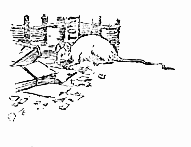
Y con estas corteses razones, quedaron Buby y Ratón Pérez los mejores amigos del mundo. Conocíase á la legua que era éste un ratón muy de mundo, acostumbrado á pisar alfombras y al trato social de personas distinguidas.
Su conversación era variada é instructiva y su erudición pasmosa. Había viajado por todas las cañerías y sótanos de la corte, y anidado en todos los archivos y bibliotecas: sólo en la Real Academia Española se comió en menos de una semana tres manuscritos inéditos que había depositado allí cierto autor ilustre.
Habló también de su familia, que no era muy numerosa: dos hijas, ya casaderas, Adelaida y Elvira, y un hijo adolescente, Adolfo, que seguía la carrera diplomática, en el cajón mismo en que el Ministro de Estado guardaba sus notas secretas. De su mujer habló poco y como de paso, por lo cual sospechó el Reyecito que habría allí alguna messa allianza, ó quizá disensiones matrimoniales.
Oíale todo esto el rey Buby embobado, extendiendo de cuándo en cuándo maquinalmente la manita, para cogerle por el rabo. Mas Ratón Pérez, con una oscilación rápida y ceremoniosa, ponía el rabo de la otra parte, burlando así el intento del niño, sin faltar en nada al respeto debido al Monarca.
Era ya tarde, y como el rey Buby no pensaba en despedirle, Ratón Pérez insinuó hábilmente, sin faltar á la etiqueta, que le era forzoso acudir aquella misma noche á la calle de Jacometrezo, número 64, para recoger el diente de otro niño muy pobre, que se llamaba Gilito. Era el camino áspero y hasta cierto punto peligroso, porque había en la vecindad un gato muy mal intencionado, que llamaban D. Gaiferos.

Antojósele al rey Buby acompañarle en aquella expedición, y así se lo pidió á Ratón Pérez con el mayor ahinco. Quedóse éste pensativo, atusándose el bigote: la responsabilidad era muy grande, y érale forzoso además detenerse en su propia casa para recoger el regalo que había de llevar á Gilito en cambio de su diente.
Á esto respondió el rey Buby que él se tendría por muy honrado con descansar un momento en casa tan respetable.
La vanidad venció á Ratón Pérez, y apresuróse á ofrecer al rey Buby una taza de té, á trueque de conquistar el derecho de poner cadenas en la puerta de su casa, como se hacía en aquellos tiempos en todas las que conseguían el honor de hospedar á un monarca.
Vivía Ratón Pérez en la calle del Arenal, núm. 8, en los sótanos de Carlos Prats[A], frente por frente de una gran pila de quesos de Gruyère, que ofrecían á la familia de Pérez, próxima y abastada despensa.
Fuera de sí de contento, tiróse el rey Buby de la cama, y comenzó á ponerse su blusita. Mas Ratón Pérez saltó de repente sobre su hombro, y le metió por la nariz la punta del rabo: estornudó estrepitosamente el Reyecito, y por un prodigio maravilloso, que nadie hasta el día de hoy ha podido explicarse, quedó convertido, por el mismo esfuerzo del estornudo, en el ratón más lindo y primoroso que imaginaciones de hadas pudieran soñar.
Era todo él brillante como el oro, y suave como la seda, y tenía los ojitos verdes y relucientes como dos esmeraldas cabochon.

Tomóle de la mano Ratón Pérez, sin usar ya tantas ceremonias, y entróse con él, disparado como una bala, por un agujero que debajo de la cama y oculto por la alfombra había.
Era su carrera desatinada, obscuro el camino, húmedo y hasta pegajoso, y cruzábanse á cada paso con bandadas de diminutas alimañas, que á tientas les pinchaban y mordían.
Á veces deteníase Ratón Pérez en alguna encrucijada, y exploraba el terreno antes de seguir adelante: todo lo cual puso al rey Buby un poco nervioso y de mal humor, porque llegó á sentir desde el hociquito hasta la punta del rabo ciertos ligeros escalofríos que le parecieron señales de miedo. Acordóse, sin embargo, de que
| El miedo es natural en el prudente, |
| Y el saberlo vencer es ser valiente, |
y se venció y fué valiente por razón, que es en lo que el verdadero valor consiste.
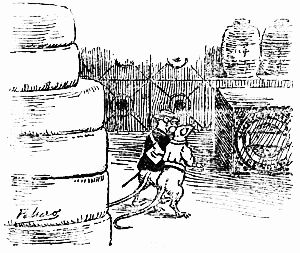
Tan sólo una vez, al sentir un estrépito espantoso sobre su cabeza, que no parecía sino que pasaban por encima diez docenas de Ripers-Oliva[B], preguntó muy bajito á Ratón Pérez si era allí donde vivía D. Gaiferos. Contestóle Ratón Pérez haciendo con el rabo un ademán negativo, y siguieron adelante.
Á poco entraron en una suave explanada, que venía á desembocar en un sótano ancho y muy bien embaldosado, donde se respiraba una atmósfera tibia, perfumada de queso. Doblaron una enorme pila de éstos, y encontráronse frente á frente de una gran caja de galletas de Huntley.
Allí era donde vivía la familia de Ratón Pérez, bajo el pabellón de Carlos Prats, tan á sus anchas y con tanta holgura, como pudo vivir la rata legendaria de la fábula, en el queso de Holanda.
Ratón Pérez presentó el rey Buby á su familia como un touriste extranjero que visitaba la corte, y las ratonas le acogieron con esa elegante aisance de las damas acostumbradas á mucho trato. Las señoritas hacían labor con su aya Miss Old-Cheese, ratona inglesa muy ilustrada, y la señora de Pérez bordaba para su marido un precioso gorro griego al calor de una chimenea en que ardía alegre fuego de rabitos de pasas.
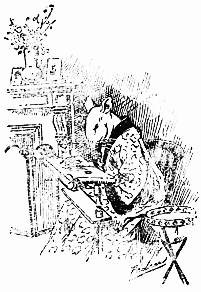
Agradó mucho al rey Buby aquel plácido interior de familia burguesa, que revelaba en todos sus detalles esa aurea mediocritas (dorada medianía) de que habla el poeta como del estado más apto para hallar paz y felicidad en esta vida.
Sirvieron el té Adelaida y Elvira en primorosas tazas de cáscaras de alubias, y luego se hizo un poco de música. Adelaida cantó al arpa el aria de Desdémona, assisa al pie d'un salice, con un gusto y afinación que encantaron al rey Buby.

No era Adelaida bonita, pero tenía modales muy distinguidos, y hacía oscilar su rabo con cierta melancólica coquetería, que revelaba, sin duda, alguna pena secreta.
Elvira, por el contrario, era vivaracha y hasta un poco ordinaria; pero la energía de su alma le rebosaba por los ojos, y el rey Buby creyó ver delante de sí una espartana repitiendo el himno de las Termópilas, cuando cantó al piano con trágica entonación y enérgicos rencores de raza:
| En el Hospital del Rey |
| Hay un ratón con tercianas, |
| Y una gatita morisca |
| Le está encomendando el alma. |
Entró en esto Adolfo, que venía del Jockey-Club, donde con harto sentimiento de sus padres perdía tiempo y dinero jugando al Pocker con los ratones agregados á la Embajada alemana.
El roce continuo con estos diplomáticos le había engreído y extranjerizado, y no tenía otros tópicos de conversación que el Polo y el Lawn-Tennis.

Con gusto hubiera prolongado el rey Buby la velada, pero Ratón Pérez, que se había ausentado un momento, volvió con su cartera terciada á la espalda, y al parecer bien repleta, y le manifestó respetuosamente que ya era hora de partir.
Hizo, pues, el rey Buby, con mucha gracia, sus corteses ofrecimientos de despedida, y la Ratona Pérez, en un arranque de cordialidad un poco burguesa, plantóle en cada mejilla un sonoro beso. Adelaida le tendió una pata con cierto aire sentimental, que parecía decir:
—¡Hasta el cielo!
Elvira le dió un apretón de manos á la inglesa, y Miss Old-Cheese le hizo una ceremoniosa cortesía á lo reina Ana Stuard, y le enfiló su lorgnon de concha hasta que le perdió de vista.
Adolfo estuvo también muy expresivo: acompañóles hasta la entrada de la cañería, y allí reiteró á Buby su ofrecimiento de presentarlo en el Polo-Club, y le recomendó por tercera vez el uso de las raquetas J. Tate del núm. 12, ó á lo más del 12½. Las del 13 resultaban ya, para manos ratoniles, algo pesadas.
Agradecióselo mucho el Reyecito, y se despidió pensando que Adolfo podría ser en verdad muy elegante, pero que sin duda tenía los sesos de picatoste.
Comenzaron de nuevo su desatinada carrera Buby y Ratón Pérez, con un lujo de precauciones que sobresaltaron al Reyecito.
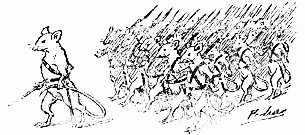
Caminaba delante un grueso pelotón de fornidos ratones, gente toda de guerra, cuyas aceradas bayonetas de finas agujas relumbraban á veces en la obscuridad. Detrás venía otro pelotón no menos numeroso, armados también hasta los dientes.
Confesó entonces Ratón Pérez que no se había determinado á emprender aquella expedición, sin garantir suficientemente con aquella aguerrida escolta de Cazadores ligeros la persona del joven monarca que con tanta nobleza se le confiaba.
De repente vió el rey Buby que desaparecía la vanguardia entera por un estrecho agujero, que dejaba escapar reflejos de tenue luz.
Había llegado el momento del peligro, y Ratón Pérez, despacito, haciendo vibrar suavemente la punta del rabo, asomó poquito á poco el hocico por aquel temeroso boquete: observó un segundo, retrocedió dos pasos, tornó á avanzar lentamente, y de improviso, agarrando al rey Buby por la mano, lanzóse con la rapidez de una flecha por el agujero, atravesó como una exhalación una extensa cocina, y desapareció por otro agujero que frente por frente había, detrás del fogón.
Con la rapidez con que se ven en el día de hoy desfilar los palos del telégrafo por las ventanillas de un tren, así vió pasar el rey Buby ante sus ojos, en su veloz carrera, el pavoroso cuadro de aquella cocina... Al calorcito de la lumbre oculta bajo el rescoldo dormía el temido D. Gaiferos, gatazo enorme, cartujano, cuyos erizados bigotes subían y bajaban al compás de su pausada respiración...
La guardia ratonil, inmóvil, silenciosa, preparada, mordiendo ya casi el cartucho, protegía el paso del rey Buby, formando desde el dormido D. Gaiferos hasta los dos agujeros de entrada y de salida el formidable triángulo romano de la batalla de Ecnoma...
Era aquello imponente y aterrador...
Una vieja feísima dormía en una silla, con la calceta á medio hacer caída sobre las faldas.
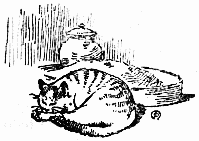
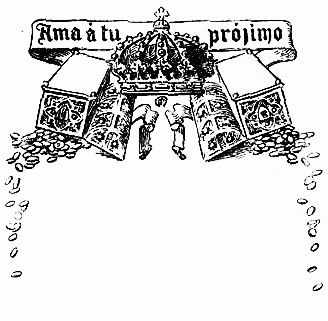
Cesó el peligro una vez franqueado el agujero de salida, y faltaba ya tan sólo subir á la última buhardilla de aquella misma casa, que era donde Gilito vivía. Todo era entrada en aquella miserable habitación abierta á todos los vientos, y los ratones la invadieron por rendijas, grietas y agujeros, como se invade una ciudad ya desmantelada.
Encaramóse el rey Buby en el palo de una silla sin asiento, única que había, y desde allí pudo abarcar todo aquel cuadro de horrible miseria, que nunca hubiera podido ni aun siquiera imaginar.
Era aquello un cuchitril infecto, en que el techo y el suelo se unían por un lado, y no se separaban lo bastante por el otro para dejar cabida á la estatura de un hombre. Entraba por las innumerables rendijas el viento helado del alba, que ya clareaba, y veíanse por debajo de la tejavana del techo grandes cuajarones de hielo.
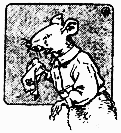
No había allí más muebles que la silla que servía de observatorio al rey Buby, un cesto de pan vacío, colgado del techo á la altura de la mano, y en el rincón menos expuesto á la intemperie, una cama de pajas y de trapos, en que dormían abrazados Gilito y su madre.
Acercóse Ratón Pérez, llevando al rey Buby de la mano, y al ver éste de cerca al pobre Gilito, asomando las yertas manecitas por los trapos miserables que le cubrían, y pegada la preciosa carita al seno de su madre, para buscar allí un poco de calor, angustiósele el corazón de pena y de asombro, y rompió á llorar amargamente.
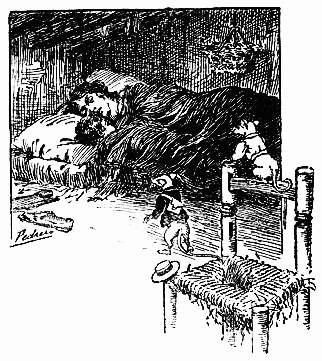
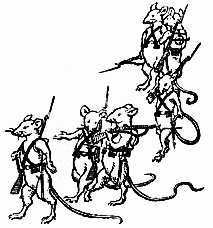
¡Pero si él nunca había visto eso!... ¿Cómo era posible que no hubiese él sabido hasta entonces que había niños pobres que tenían hambre y frío y se morían de miseria y de tristeza en un horrible camaranchón?... ¡Ni mantas quería él ya tener en su cama, mientras hubiese en su reino un solo niño que no tuviera por lo menos tres calzones de bayeta y un vestidito de bombasí!...
Conmovido también Ratón Pérez, se enjugó á hurtadillas una lágrima con la pata, y procuró calmar el dolor del rey Buby, enseñándole la brillante monedita de oro que iba á poner bajo la almohada de Gilito, en cambio de su primer diente.
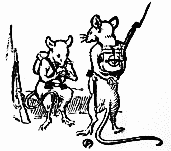
Despertó en esto la madre de Gilito, é incorporóse en el lecho, contemplando al niño dormido. Amanecía ya, y érale forzoso levantarse para ganar un mísero jornal, lavando en el río. Cogió á Gilito en sus brazos, y le puso de rodillas, medio dormido, delante de una estampita del Niño Jesús de Praga que había pegada en la pared, sobre la misma cama.

El rey Buby y Ratón Pérez se pusieron de rodillas con el mayor respeto, y hasta los cazadores ligeros se arrodillaron también, dentro del canasto vacío en que merodeaban silenciosos.

El niño comenzó á rezar:
—¡Padre nuestro, que estás en los cielos!...
Hizo el rey Buby un gesto de inmensa sorpresa al oirle, y se quedó mirando á Ratón Pérez con la boca abierta.

Comprendió éste su estupor y fijó en el Reyecito sus penetrantes ojos; mas no dijo una sola palabra, esperando sin duda que otro las dijese.
Emprendieron el viaje de vuelta silenciosos y preocupados, y media hora después entraba el rey Buby en su alcoba con Ratón Pérez.

Tornó allí éste á meter en la nariz del Rey la punta de su rabo; estornudó de nuevo Buby estrepitosamente, y encontróse acostadito en su cama, en los brazos de la Reina, que le despertaba, como todos los días, con un cariñoso beso de madre.
Creyó, por el pronto, que todo había sido sueño; mas levantó prontamente la almohada, buscando la carta para Ratón Pérez que había puesto allí la noche antes, y la carta había desaparecido.
En su lugar había un precioso estuche con la insignia del Toisón de Oro, toda cuajada de brillantes, regalo magnífico que le hacía el generoso Ratón Pérez, en cambio de su primer diente.
Dejólo caer, sin embargo, el Reyecito sobre la rica colcha, sin mirarlo casi, y quedóse largo tiempo pensativo, con el codo apoyado en la almohada. De pronto dijo, con esa expresión seria y meditabunda que toman á veces los niños, cuando reflexionan ó sufren:
—Mamá... ¿Por qué los niños pobres rezan lo mismo que yo, Padre nuestro, que estás en los cielos?...
La Reina le respondió:
—Porque Dios es padre de ellos, lo mismo que lo es tuyo.
—Entonces—replicó Buby aun más pensativo—seremos hermanos...
—Sí, hijo mío; son tus hermanos.

Los ojitos de Buby rebosaron entonces admiración profunda, y con la voz empañada por las lágrimas y trémulo el pechito por el temblor de un sollozo, preguntó:
—¿Y por qué soy yo Rey, y tengo de todo, y ellos son pobres y no tienen de nada?

Apretóle la Reina contra su corazón con amor inmenso, y besándole en la frente, le dijo:
—Porque tú eres el hermano mayor, que eso es ser Rey... ¿Lo entiendes, Buby?... Y Dios te ha dado de todo, para que cuides en lo posible de que tus hermanos menores no carezcan de nada.
—Yo no sabía eso—dijo Buby, meneando con pena la cabecita.
Y sin acordarse más del Toisón de Oro, púsose á rezar, como todos los días, sus oraciones de la mañana. Y á medida que rezaba, parecíale que todos los Gilitos pobres y desvalidos del reino se agrupaban en torno suyo, alzando también á Dios sus manitas, y que él decía, llevando, como hermano mayor, la voz de todos:
—¡Padre nuestro, que estás en los cielos!...
Y cuando el rey Buby fué ya un hombre y un gran guerrero, y tuvo que pedir á Dios auxilio en los trabajos, y darle gracias en las alegrías, siempre dijo, llevando la voz de todos sus súbditos, pobres y ricos, buenos y malos:
—¡Padre nuestro, que estás en los cielos!...
Y cuando murió el rey Buby, ya muy ancianito, y llegó su buena alma á las puertas del cielo, allí se arrodilló y dijo como siempre:
—¡Padre nuestro, que estás en los cielos!...

Y en cuanto esto dijo, le abrieron las puertas de par en par miles y miles de pobres Gilitos, de que había sido Rey, es decir, hermano mayor, acá en la tierra...

Biblioteca de RAZÓN Y FE
MADRID
/\/\/\/\/\/\/\/\/\/\/\/\/\/\/\/\/\/\/\/\/\/\/\/\/\/\/\/\/\/\/\/\/\/\/\/\/\
EL MARQUÉS DE MORA
POR EL
P. LUIS COLOMA, S. J.
La gran revolución social y religiosa, saliendo de los aristocráticos salones de Versailles, para volcar los tronos y ensangrentar y envenenar la Europa con el virus de la Enciclopedia: he aquí el argumento de esta novelesca historia por demás instructiva é interesante. Las dotes literarias de su autor, tan consumado en la pintura de caracteres, en la descripción de la vida aristocrática, y dueño de todos los primores del estilo, le añaden el encanto que se halla en todas las obras del autor de Pequeñeces.
Precio: 1,50 pesetas en rústica y 2,50 en tela.
=BOY=
POR EL
P. LUIS COLOMA, S. J.
de la Real Academia Española.
————
2.ª EDICION
————
Un elegantísimo tomo en 8.º, de 381 páginas, 3,50 pesetas en rústica y 4,50 en tela inglesa.
Preciosa novela, y una de las más interesantes y mejor escritas del autor; publicada hoy íntegra por primera vez, viene á satisfacer los deseos de las muchas personas inteligentes que leyeron ya los primeros capítulos, y vieron con pena su repentina interrupción. Presenta animadísimos cuadros de costumbres de ciertas clases sociales, tipos de honradez acrisolada y también de criminal astucia y modelos de fina amistad y compañerismo; conmueve profundamente en su triste desenlace, que, por otra parte, se ve coronado con un nimbo de luz de la divina misericordia, dejando el ánimo del lector suavemente resignado y satisfecho.
Diríjanse los pedidos, acompañados de su importe, más 25 céntimos por el certificado, al señor Administrador de RAZÓN Y FE.
APARTADO 386 MADRID

NOTAS:
[A] Famosa tienda de ultramarinos, existente en Madrid, en el lugar citado.
[B] Especie de ómnibus que circulaban por las calles de Madrid antes de los tranvías.
End of the Project Gutenberg EBook of Ratón Pérez, by Luis Coloma
*** END OF THIS PROJECT GUTENBERG EBOOK RATÓN PÉREZ ***
***** This file should be named 36558-h.htm or 36558-h.zip *****
This and all associated files of various formats will be found in:
http://www.gutenberg.org/3/6/5/5/36558/
Produced by Chuck Greif and the Online Distributed
Proofreading Team at http://www.pgdp.net
(para Lucia)
Updated editions will replace the previous one--the old editions
will be renamed.
Creating the works from public domain print editions means that no
one owns a United States copyright in these works, so the Foundation
(and you!) can copy and distribute it in the United States without
permission and without paying copyright royalties. Special rules,
set forth in the General Terms of Use part of this license, apply to
copying and distributing Project Gutenberg-tm electronic works to
protect the PROJECT GUTENBERG-tm concept and trademark. Project
Gutenberg is a registered trademark, and may not be used if you
charge for the eBooks, unless you receive specific permission. If you
do not charge anything for copies of this eBook, complying with the
rules is very easy. You may use this eBook for nearly any purpose
such as creation of derivative works, reports, performances and
research. They may be modified and printed and given away--you may do
practically ANYTHING with public domain eBooks. Redistribution is
subject to the trademark license, especially commercial
redistribution.
*** START: FULL LICENSE ***
THE FULL PROJECT GUTENBERG LICENSE
PLEASE READ THIS BEFORE YOU DISTRIBUTE OR USE THIS WORK
To protect the Project Gutenberg-tm mission of promoting the free
distribution of electronic works, by using or distributing this work
(or any other work associated in any way with the phrase "Project
Gutenberg"), you agree to comply with all the terms of the Full Project
Gutenberg-tm License (available with this file or online at
http://gutenberg.org/license).
Section 1. General Terms of Use and Redistributing Project Gutenberg-tm
electronic works
1.A. By reading or using any part of this Project Gutenberg-tm
electronic work, you indicate that you have read, understand, agree to
and accept all the terms of this license and intellectual property
(trademark/copyright) agreement. If you do not agree to abide by all
the terms of this agreement, you must cease using and return or destroy
all copies of Project Gutenberg-tm electronic works in your possession.
If you paid a fee for obtaining a copy of or access to a Project
Gutenberg-tm electronic work and you do not agree to be bound by the
terms of this agreement, you may obtain a refund from the person or
entity to whom you paid the fee as set forth in paragraph 1.E.8.
1.B. "Project Gutenberg" is a registered trademark. It may only be
used on or associated in any way with an electronic work by people who
agree to be bound by the terms of this agreement. There are a few
things that you can do with most Project Gutenberg-tm electronic works
even without complying with the full terms of this agreement. See
paragraph 1.C below. There are a lot of things you can do with Project
Gutenberg-tm electronic works if you follow the terms of this agreement
and help preserve free future access to Project Gutenberg-tm electronic
works. See paragraph 1.E below.
1.C. The Project Gutenberg Literary Archive Foundation ("the Foundation"
or PGLAF), owns a compilation copyright in the collection of Project
Gutenberg-tm electronic works. Nearly all the individual works in the
collection are in the public domain in the United States. If an
individual work is in the public domain in the United States and you are
located in the United States, we do not claim a right to prevent you from
copying, distributing, performing, displaying or creating derivative
works based on the work as long as all references to Project Gutenberg
are removed. Of course, we hope that you will support the Project
Gutenberg-tm mission of promoting free access to electronic works by
freely sharing Project Gutenberg-tm works in compliance with the terms of
this agreement for keeping the Project Gutenberg-tm name associated with
the work. You can easily comply with the terms of this agreement by
keeping this work in the same format with its attached full Project
Gutenberg-tm License when you share it without charge with others.
1.D. The copyright laws of the place where you are located also govern
what you can do with this work. Copyright laws in most countries are in
a constant state of change. If you are outside the United States, check
the laws of your country in addition to the terms of this agreement
before downloading, copying, displaying, performing, distributing or
creating derivative works based on this work or any other Project
Gutenberg-tm work. The Foundation makes no representations concerning
the copyright status of any work in any country outside the United
States.
1.E. Unless you have removed all references to Project Gutenberg:
1.E.1. The following sentence, with active links to, or other immediate
access to, the full Project Gutenberg-tm License must appear prominently
whenever any copy of a Project Gutenberg-tm work (any work on which the
phrase "Project Gutenberg" appears, or with which the phrase "Project
Gutenberg" is associated) is accessed, displayed, performed, viewed,
copied or distributed:
This eBook is for the use of anyone anywhere at no cost and with
almost no restrictions whatsoever. You may copy it, give it away or
re-use it under the terms of the Project Gutenberg License included
with this eBook or online at www.gutenberg.org
1.E.2. If an individual Project Gutenberg-tm electronic work is derived
from the public domain (does not contain a notice indicating that it is
posted with permission of the copyright holder), the work can be copied
and distributed to anyone in the United States without paying any fees
or charges. If you are redistributing or providing access to a work
with the phrase "Project Gutenberg" associated with or appearing on the
work, you must comply either with the requirements of paragraphs 1.E.1
through 1.E.7 or obtain permission for the use of the work and the
Project Gutenberg-tm trademark as set forth in paragraphs 1.E.8 or
1.E.9.
1.E.3. If an individual Project Gutenberg-tm electronic work is posted
with the permission of the copyright holder, your use and distribution
must comply with both paragraphs 1.E.1 through 1.E.7 and any additional
terms imposed by the copyright holder. Additional terms will be linked
to the Project Gutenberg-tm License for all works posted with the
permission of the copyright holder found at the beginning of this work.
1.E.4. Do not unlink or detach or remove the full Project Gutenberg-tm
License terms from this work, or any files containing a part of this
work or any other work associated with Project Gutenberg-tm.
1.E.5. Do not copy, display, perform, distribute or redistribute this
electronic work, or any part of this electronic work, without
prominently displaying the sentence set forth in paragraph 1.E.1 with
active links or immediate access to the full terms of the Project
Gutenberg-tm License.
1.E.6. You may convert to and distribute this work in any binary,
compressed, marked up, nonproprietary or proprietary form, including any
word processing or hypertext form. However, if you provide access to or
distribute copies of a Project Gutenberg-tm work in a format other than
"Plain Vanilla ASCII" or other format used in the official version
posted on the official Project Gutenberg-tm web site (www.gutenberg.org),
you must, at no additional cost, fee or expense to the user, provide a
copy, a means of exporting a copy, or a means of obtaining a copy upon
request, of the work in its original "Plain Vanilla ASCII" or other
form. Any alternate format must include the full Project Gutenberg-tm
License as specified in paragraph 1.E.1.
1.E.7. Do not charge a fee for access to, viewing, displaying,
performing, copying or distributing any Project Gutenberg-tm works
unless you comply with paragraph 1.E.8 or 1.E.9.
1.E.8. You may charge a reasonable fee for copies of or providing
access to or distributing Project Gutenberg-tm electronic works provided
that
- You pay a royalty fee of 20% of the gross profits you derive from
the use of Project Gutenberg-tm works calculated using the method
you already use to calculate your applicable taxes. The fee is
owed to the owner of the Project Gutenberg-tm trademark, but he
has agreed to donate royalties under this paragraph to the
Project Gutenberg Literary Archive Foundation. Royalty payments
must be paid within 60 days following each date on which you
prepare (or are legally required to prepare) your periodic tax
returns. Royalty payments should be clearly marked as such and
sent to the Project Gutenberg Literary Archive Foundation at the
address specified in Section 4, "Information about donations to
the Project Gutenberg Literary Archive Foundation."
- You provide a full refund of any money paid by a user who notifies
you in writing (or by e-mail) within 30 days of receipt that s/he
does not agree to the terms of the full Project Gutenberg-tm
License. You must require such a user to return or
destroy all copies of the works possessed in a physical medium
and discontinue all use of and all access to other copies of
Project Gutenberg-tm works.
- You provide, in accordance with paragraph 1.F.3, a full refund of any
money paid for a work or a replacement copy, if a defect in the
electronic work is discovered and reported to you within 90 days
of receipt of the work.
- You comply with all other terms of this agreement for free
distribution of Project Gutenberg-tm works.
1.E.9. If you wish to charge a fee or distribute a Project Gutenberg-tm
electronic work or group of works on different terms than are set
forth in this agreement, you must obtain permission in writing from
both the Project Gutenberg Literary Archive Foundation and Michael
Hart, the owner of the Project Gutenberg-tm trademark. Contact the
Foundation as set forth in Section 3 below.
1.F.
1.F.1. Project Gutenberg volunteers and employees expend considerable
effort to identify, do copyright research on, transcribe and proofread
public domain works in creating the Project Gutenberg-tm
collection. Despite these efforts, Project Gutenberg-tm electronic
works, and the medium on which they may be stored, may contain
"Defects," such as, but not limited to, incomplete, inaccurate or
corrupt data, transcription errors, a copyright or other intellectual
property infringement, a defective or damaged disk or other medium, a
computer virus, or computer codes that damage or cannot be read by
your equipment.
1.F.2. LIMITED WARRANTY, DISCLAIMER OF DAMAGES - Except for the "Right
of Replacement or Refund" described in paragraph 1.F.3, the Project
Gutenberg Literary Archive Foundation, the owner of the Project
Gutenberg-tm trademark, and any other party distributing a Project
Gutenberg-tm electronic work under this agreement, disclaim all
liability to you for damages, costs and expenses, including legal
fees. YOU AGREE THAT YOU HAVE NO REMEDIES FOR NEGLIGENCE, STRICT
LIABILITY, BREACH OF WARRANTY OR BREACH OF CONTRACT EXCEPT THOSE
PROVIDED IN PARAGRAPH F3. YOU AGREE THAT THE FOUNDATION, THE
TRADEMARK OWNER, AND ANY DISTRIBUTOR UNDER THIS AGREEMENT WILL NOT BE
LIABLE TO YOU FOR ACTUAL, DIRECT, INDIRECT, CONSEQUENTIAL, PUNITIVE OR
INCIDENTAL DAMAGES EVEN IF YOU GIVE NOTICE OF THE POSSIBILITY OF SUCH
DAMAGE.
1.F.3. LIMITED RIGHT OF REPLACEMENT OR REFUND - If you discover a
defect in this electronic work within 90 days of receiving it, you can
receive a refund of the money (if any) you paid for it by sending a
written explanation to the person you received the work from. If you
received the work on a physical medium, you must return the medium with
your written explanation. The person or entity that provided you with
the defective work may elect to provide a replacement copy in lieu of a
refund. If you received the work electronically, the person or entity
providing it to you may choose to give you a second opportunity to
receive the work electronically in lieu of a refund. If the second copy
is also defective, you may demand a refund in writing without further
opportunities to fix the problem.
1.F.4. Except for the limited right of replacement or refund set forth
in paragraph 1.F.3, this work is provided to you 'AS-IS' WITH NO OTHER
WARRANTIES OF ANY KIND, EXPRESS OR IMPLIED, INCLUDING BUT NOT LIMITED TO
WARRANTIES OF MERCHANTIBILITY OR FITNESS FOR ANY PURPOSE.
1.F.5. Some states do not allow disclaimers of certain implied
warranties or the exclusion or limitation of certain types of damages.
If any disclaimer or limitation set forth in this agreement violates the
law of the state applicable to this agreement, the agreement shall be
interpreted to make the maximum disclaimer or limitation permitted by
the applicable state law. The invalidity or unenforceability of any
provision of this agreement shall not void the remaining provisions.
1.F.6. INDEMNITY - You agree to indemnify and hold the Foundation, the
trademark owner, any agent or employee of the Foundation, anyone
providing copies of Project Gutenberg-tm electronic works in accordance
with this agreement, and any volunteers associated with the production,
promotion and distribution of Project Gutenberg-tm electronic works,
harmless from all liability, costs and expenses, including legal fees,
that arise directly or indirectly from any of the following which you do
or cause to occur: (a) distribution of this or any Project Gutenberg-tm
work, (b) alteration, modification, or additions or deletions to any
Project Gutenberg-tm work, and (c) any Defect you cause.
Section 2. Information about the Mission of Project Gutenberg-tm
Project Gutenberg-tm is synonymous with the free distribution of
electronic works in formats readable by the widest variety of computers
including obsolete, old, middle-aged and new computers. It exists
because of the efforts of hundreds of volunteers and donations from
people in all walks of life.
Volunteers and financial support to provide volunteers with the
assistance they need, are critical to reaching Project Gutenberg-tm's
goals and ensuring that the Project Gutenberg-tm collection will
remain freely available for generations to come. In 2001, the Project
Gutenberg Literary Archive Foundation was created to provide a secure
and permanent future for Project Gutenberg-tm and future generations.
To learn more about the Project Gutenberg Literary Archive Foundation
and how your efforts and donations can help, see Sections 3 and 4
and the Foundation web page at http://www.pglaf.org.
Section 3. Information about the Project Gutenberg Literary Archive
Foundation
The Project Gutenberg Literary Archive Foundation is a non profit
501(c)(3) educational corporation organized under the laws of the
state of Mississippi and granted tax exempt status by the Internal
Revenue Service. The Foundation's EIN or federal tax identification
number is 64-6221541. Its 501(c)(3) letter is posted at
http://pglaf.org/fundraising. Contributions to the Project Gutenberg
Literary Archive Foundation are tax deductible to the full extent
permitted by U.S. federal laws and your state's laws.
The Foundation's principal office is located at 4557 Melan Dr. S.
Fairbanks, AK, 99712., but its volunteers and employees are scattered
throughout numerous locations. Its business office is located at
809 North 1500 West, Salt Lake City, UT 84116, (801) 596-1887, email
business@pglaf.org. Email contact links and up to date contact
information can be found at the Foundation's web site and official
page at http://pglaf.org
For additional contact information:
Dr. Gregory B. Newby
Chief Executive and Director
gbnewby@pglaf.org
Section 4. Information about Donations to the Project Gutenberg
Literary Archive Foundation
Project Gutenberg-tm depends upon and cannot survive without wide
spread public support and donations to carry out its mission of
increasing the number of public domain and licensed works that can be
freely distributed in machine readable form accessible by the widest
array of equipment including outdated equipment. Many small donations
($1 to $5,000) are particularly important to maintaining tax exempt
status with the IRS.
The Foundation is committed to complying with the laws regulating
charities and charitable donations in all 50 states of the United
States. Compliance requirements are not uniform and it takes a
considerable effort, much paperwork and many fees to meet and keep up
with these requirements. We do not solicit donations in locations
where we have not received written confirmation of compliance. To
SEND DONATIONS or determine the status of compliance for any
particular state visit http://pglaf.org
While we cannot and do not solicit contributions from states where we
have not met the solicitation requirements, we know of no prohibition
against accepting unsolicited donations from donors in such states who
approach us with offers to donate.
International donations are gratefully accepted, but we cannot make
any statements concerning tax treatment of donations received from
outside the United States. U.S. laws alone swamp our small staff.
Please check the Project Gutenberg Web pages for current donation
methods and addresses. Donations are accepted in a number of other
ways including checks, online payments and credit card donations.
To donate, please visit: http://pglaf.org/donate
Section 5. General Information About Project Gutenberg-tm electronic
works.
Professor Michael S. Hart is the originator of the Project Gutenberg-tm
concept of a library of electronic works that could be freely shared
with anyone. For thirty years, he produced and distributed Project
Gutenberg-tm eBooks with only a loose network of volunteer support.
Project Gutenberg-tm eBooks are often created from several printed
editions, all of which are confirmed as Public Domain in the U.S.
unless a copyright notice is included. Thus, we do not necessarily
keep eBooks in compliance with any particular paper edition.
Most people start at our Web site which has the main PG search facility:
http://www.gutenberg.org
This Web site includes information about Project Gutenberg-tm,
including how to make donations to the Project Gutenberg Literary
Archive Foundation, how to help produce our new eBooks, and how to
subscribe to our email newsletter to hear about new eBooks.
| Contents Listing Alphabetical by Author: |
| A B C D E F G H I J K L M N O P Q R S T U V W X Y Z Unknown Other |
| Contents Listing Alphabetical by Title: |
| # A B C D E F G H I J K L M N O P Q R S T U V W Y Z Other |
Medical Encyclopedia
|
Browse by first letter of topic: |
||||||||||||||||||||||||||||||||||||||||||
|
Biblioteca Solidaria - SPANISH
Encyclopaedia Britannica 1911 - PDF
Project Gutenberg: DVD-ROM 2007
Project Gutenberg ENGLISH Selection
Project Gutenberg SPANISH Selection
Wikipedia for Schools - ENGLISH
Wikipedia for Schools - FRENCH
Wikipedia for Schools - SPANISH
Wikipedia for Schools - PORTUGUESE
Wikipedia Picture of the Year 2006
Wikipedia Picture of the Year 2007
Wikipedia Picture of the Year 2008
Wikipedia Picture of the Year 2009